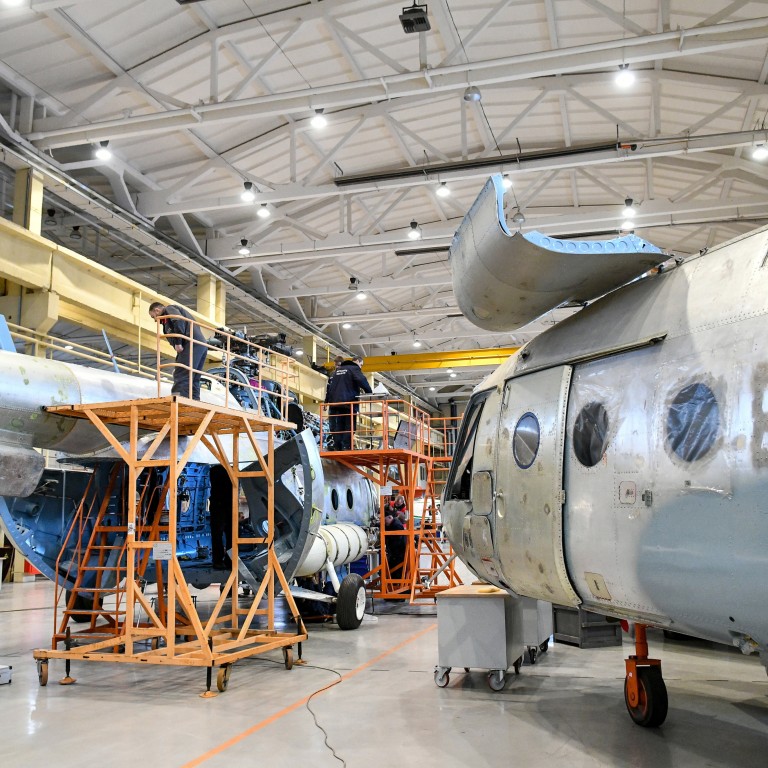
China’s Skyrizon takes Ukraine to The Hague over failed Motor Sich bid
- Chinese company seeks US$4.5 billion in compensation over deal scuppered on national security grounds
- Rare move could open up new route for Chinese investors looking for redress, observer says
Observers said the request for arbitration was rare and reflected a growing awareness among Chinese companies about resorting to the law under increased scrutiny on national security grounds.
Beijing Skyrizon Aviation Industry Investment said its Chinese investors, including its founder Wang Jing, had filed an application to the Hague-based Permanent Court of Arbitration over the failed purchase of Motor Sich, one of the world’s advanced military aircraft engine manufacturers.
“Chinese investors have suffered significant losses both in Ukraine and in China as a result of the unfair treatment by Ukraine against Chinese investors over the past five years and the continuing implementation of illegal measures,” the company said in the statement on its WeChat account on Monday.
Skyrizon, which has sought to acquire a controlling stake in Motor Sich, has accused the Ukrainian government of violating a reciprocal investment protection agreement signed between Beijing and Kyiv in 1992, adding that it had not ruled out the possibility of pursing further damages.
In the statement on Monday, Skyrizon denied any wrongdoings but claimed that the Ukrainian government had abused its state power to “politicise the normal economic and trade practices” of the Chinese companies.
“We always hope to reconcile in good faith ... and will use all possible legal weapons to resolutely defend our legitimate rights and interests,” it said.
China welcomes Ukraine U-turn on Xinjiang human rights call
Once an important part of the former Soviet Union’s defence industry, Motor Sich supplied engines to Russia’s military helicopters for decades until Russia’s annexation of Crimea in 2014.
In 2017, Skyrizon bought 41 per cent of Motor Sich and continued to seek a controlling stake. While Skyrizon said it planned to invest a further US$250 million in Ukrainian factories and would move some production to the southwestern Chinese city of Chongqing, the deal was frozen by a Ukrainian court in 2017, citing national security reasons.
The deal has also drawn concerns from Washington, which sees it as part of China’s efforts to gain some of the critical defence technologies.
In January, the Trump administration said it had blacklisted Skyrizon over its efforts to acquire foreign military technologies. Days later, Ukrainian President Volodymyr Zelensky imposed sanctions on Skyrizon, restricting its trading operations and preventing it from moving its capital outside the country.
US firms ‘evaluating’ Motor Sich amid pressure to block sale to China
Chinese investors overseas, particularly in big infrastructure projects and technology firms, are embroiled in an increasing number of legal disputes amid a growing scrutiny from the West.
Jilin University law professor He Zhipeng said it was rare for Chinese companies to go to Hague tribunals.
“Usually, Chinese companies seek arbitrations under bilateral agreements or international arbitration institutions such as the International Centre for Settlement of Investment Disputes,” He said. “Going to The Hague could be seen as a new exploratory route for Chinese companies to defend their legal rights.”
It remains unclear if the Ukrainian government would take part in the arbitration, but He said the move could inspire more Chinese companies to follow suit.
“It shows that there is a growing awareness and ability among Chinese companies to use legal means to defend their interests, and that they are finding ways to effectively defend their interests through various legal channels,” he said.
Resolving a dispute through legal channels could also avoid confrontations between countries.
“The political approach is increasingly confrontational, whereas the legal approach is stable and predictable,” he said.
China-Ukraine infrastructure deal a surprise for geopolitics observers
Peking University professor Liang Yunxiang agreed there were some positives in Skyrizon’s decision to go to The Hague.
“It shows that compared with the past, we now value the law over emotions and relationships,” Liang said.
But he said such efforts remained limited to corporate interests. “If it is a government or a political act related to the sovereignty of the state, there is certainly no recourse to law,” he said.

